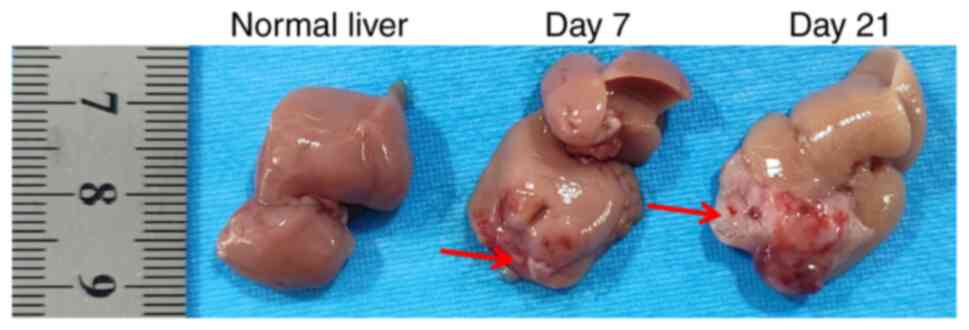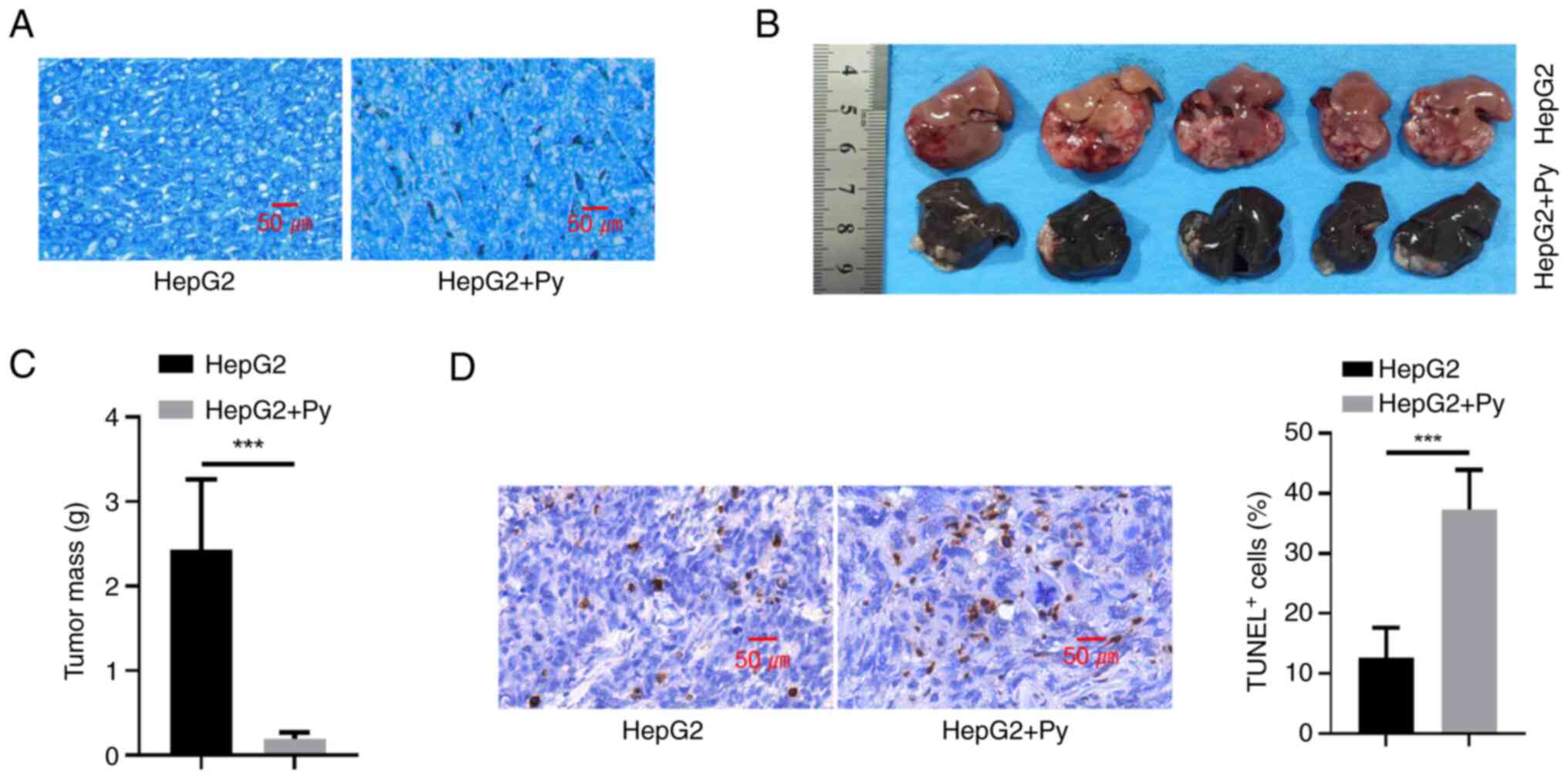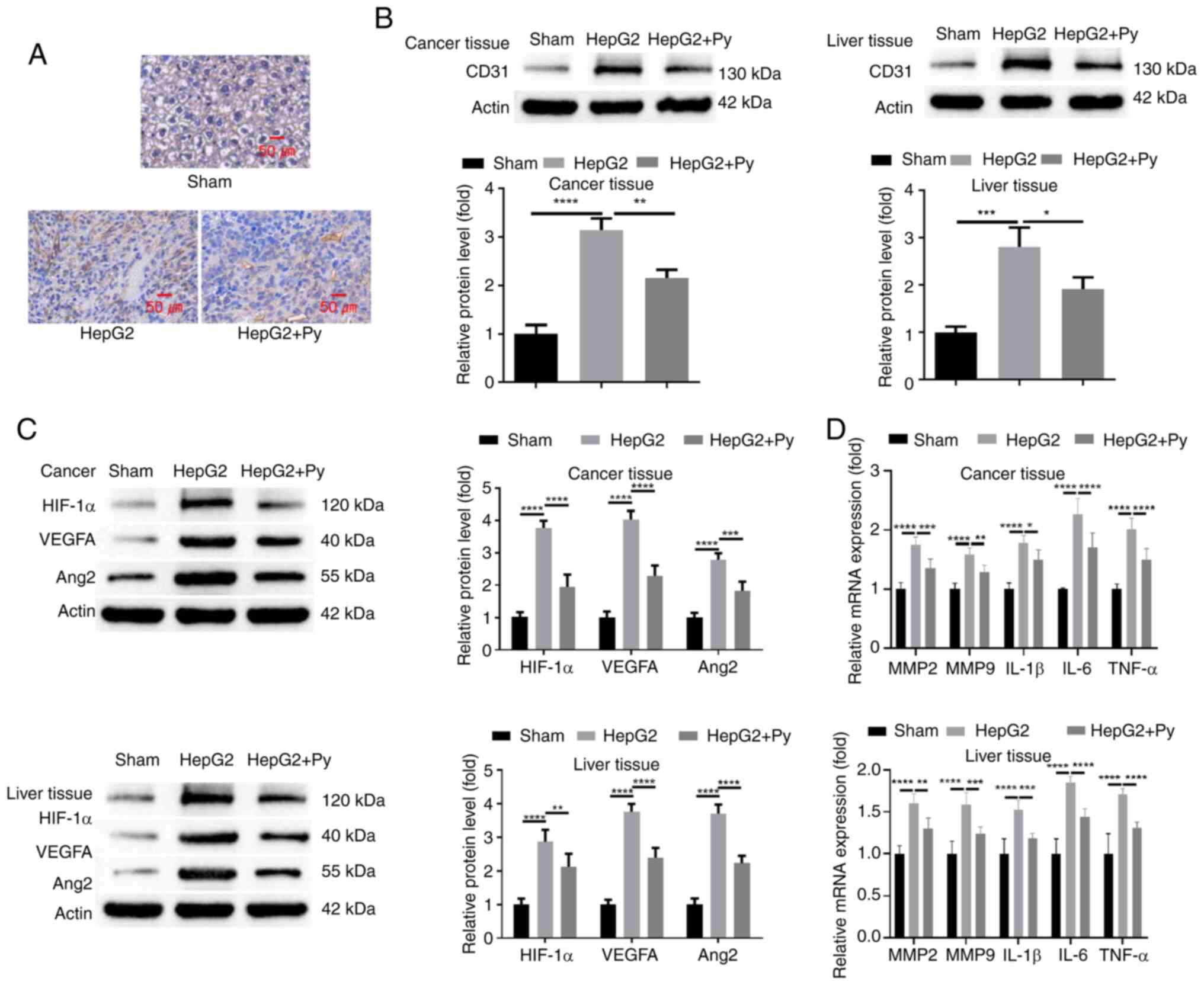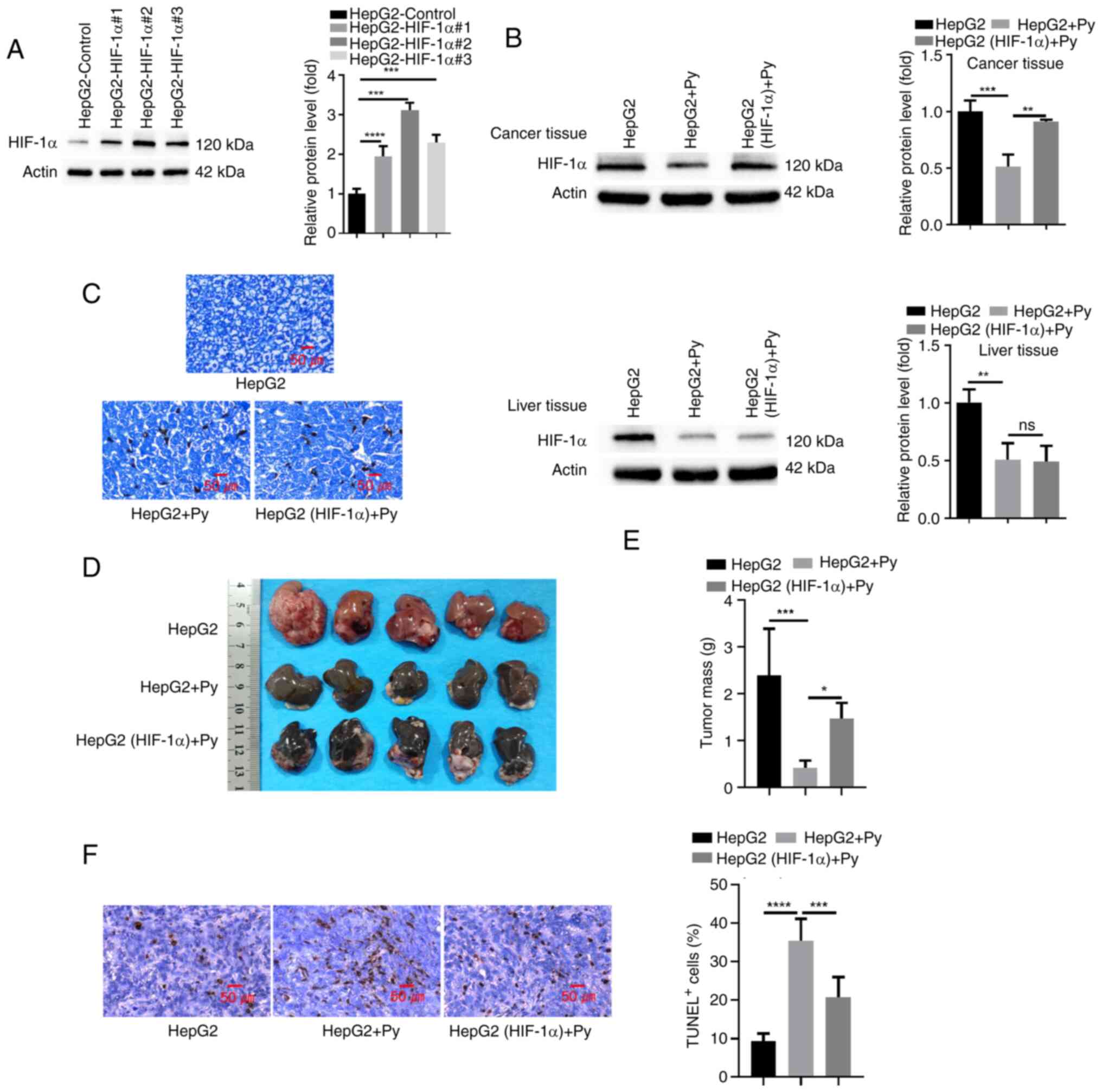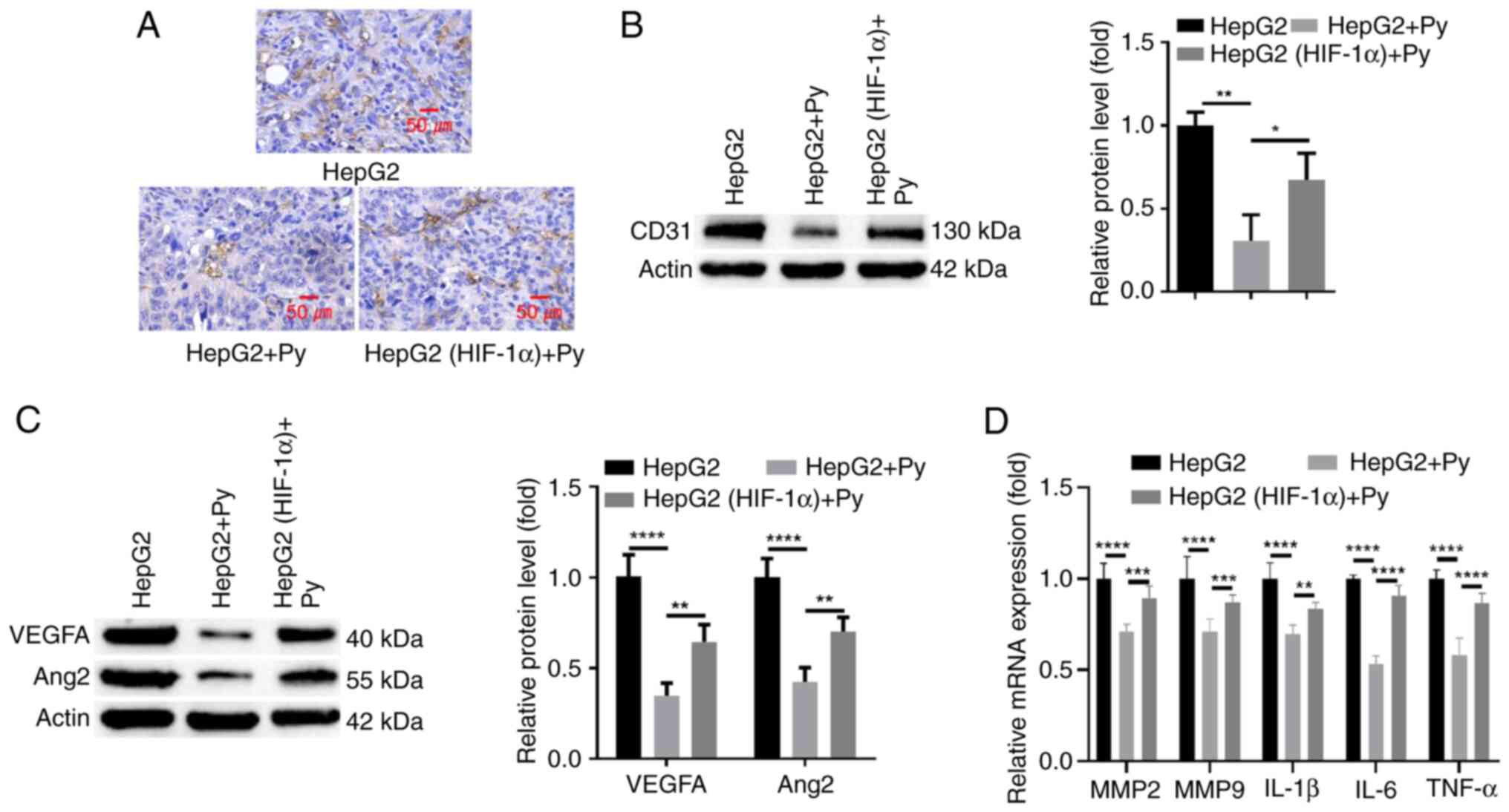|
1
|
Oh JH and Jun DW: The latest global burden
of liver cancer: A past and present threat. Clin Mol Hepatol.
29:355–357. 2023. View Article : Google Scholar
|
|
2
|
Llovet JM, Kelley RK, Villanueva A, Singal
AG, Pikarsky E, Roayaie S, Lencioni R, Koike K, Zucman-Rossi J and
Finn RS: Hepatocellular carcinoma. Nat Rev Dis Primers. 7:62021.
View Article : Google Scholar
|
|
3
|
Gilles H, Garbutt T and Landrum J:
Hepatocellular Carcinoma. Crit Care Nurs Clin North Am. 34:289–301.
2022. View Article : Google Scholar
|
|
4
|
Ganesan P and Kulik LM: Hepatocellular
carcinoma: New developments. Clin Liver Dis. 27:85–102. 2023.
View Article : Google Scholar
|
|
5
|
Siegel AB and Zhu AX: Metabolic syndrome
and hepatocellular carcinoma: Two growing epidemics with a
potential link. Cancer. 115:5651–5661. 2009. View Article : Google Scholar
|
|
6
|
Jiang Y, Han Q, Zhao H and Zhang J: The
Mechanisms of HBV–Induced Hepatocellular Carcinoma. J Hepatocell
Carcinoma. 8:435–450. 2021. View Article : Google Scholar
|
|
7
|
Powell EE, Wong VW and Rinella M:
Non-alcoholic fatty liver disease. Lancet. 397:2212–2224. 2021.
View Article : Google Scholar
|
|
8
|
Wen T, Jin C, Facciorusso A, Donadon M,
Han HS, Mao Y, Dai C, Cheng S, Zhang B, Peng B, et al:
Multidisciplinary management of recurrent and metastatic
hepatocellular carcinoma after resection: An international expert
consensus. Hepatobiliary Surg Nutr. 7:353–371. 2018. View Article : Google Scholar
|
|
9
|
Bray F, Ferlay J, Soerjomataram I, Siegel
RL, Torre LA and Jemal A: Global cancer statistics 2018: GLOBOCAN
estimates of incidence and mortality worldwide for 36 cancers in
185 countries. CA Cancer J Clin. 68:394–424. 2018. View Article : Google Scholar
|
|
10
|
Lee JC, Hung HC, Wang YC, Cheng CH, Wu TH,
Lee CF, Wu TJ, Chou HS, Chan KM and Lee WC: Risk score model for
microvascular invasion in hepatocellular carcinoma: The Role of
tumor burden and alpha-fetoprotein. Cancers (Basel). 13:44032021.
View Article : Google Scholar
|
|
11
|
Morse MA, Sun W, Kim R, He AR, Abada PB,
Mynderse M and Finn RS: The role of angiogenesis in hepatocellular
carcinoma. Clin Cancer Res. 25:912–920. 2019. View Article : Google Scholar
|
|
12
|
Moawad AW, Szklaruk J, Lall C, Blair KJ,
Kaseb AO, Kamath A, Rohren SA and Elsayes KM: Angiogenesis in
hepatocellular carcinoma; pathophysiology, targeted therapy, and
role of imaging. J Hepatocell Carcinoma. 7:77–89. 2020. View Article : Google Scholar
|
|
13
|
Pinto E, Pelizzaro F, Farinati F and Russo
FP: Angiogenesis and hepatocellular carcinoma: From molecular
mechanisms to systemic therapies. Medicina (Kaunas). 59:11152023.
View Article : Google Scholar
|
|
14
|
Deryugina EI and Quigley JP: Tumor
angiogenesis: MMP-mediated induction of intravasation- and
metastasis-sustaining neovasculature. Matrix Biol. 44–46. 94–112.
2015.
|
|
15
|
Geervliet E and Bansal R: Matrix
Metalloproteinases as potential biomarkers and therapeutic targets
in liver diseases. Cells. 9:12122020. View Article : Google Scholar
|
|
16
|
Hammam O, Mahmoud O, Zahran M, Sayed A,
Salama R, Hosny K and Farghly A: A possible role for TNF-α in
coordinating inflammation and angiogenesis in chronic liver disease
and hepatocellular carcinoma. Gastrointest Cancer Res. 6:107–114.
2013.
|
|
17
|
Pocino K, Stefanile A, Basile V, Napodano
C, D'Ambrosio F, Di Santo R, Callà CAM, Gulli F, Saporito R, Ciasca
G, et al: Cytokines and hepatocellular carcinoma: biomarkers of a
deadly embrace. J Pers Med. 13:52022. View Article : Google Scholar
|
|
18
|
Tak KH, Yu GI, Lee MY and Shin DH:
Association between polymorphisms of interleukin 1 family genes and
hepatocellular carcinoma. Med Sci Monit. 24:3488–3495. 2018.
View Article : Google Scholar
|
|
19
|
Zhu AX, Duda DG, Sahani DV and Jain RK:
HCC and angiogenesis: Possible targets and future directions. Nat
Rev Clin Oncol. 8:292–301. 2011. View Article : Google Scholar
|
|
20
|
Tavares J, Formaglio P, Thiberge S,
Mordelet E, Van Rooijen N, Medvinsky A, Ménard R and Amino R: Role
of host cell traversal by the malaria sporozoite during liver
infection. J Exp Med. 210:905–915. 2013. View Article : Google Scholar
|
|
21
|
Adah D, Yang Y, Liu Q, Gadidasu K, Tao Z,
Yu S, Dai L, Li X, Zhao S, Qin L, et al: Plasmodium infection
inhibits the expansion and activation of MDSCs and Tregs in the
tumor microenvironment in a murine Lewis lung cancer model. Cell
Commun Signal. 17:322019. View Article : Google Scholar
|
|
22
|
Yang Y, Liu Q, Lu J, Adah D, Yu S, Zhao S,
Yao Y, Qin L, Qin L and Chen X: Exosomes from Plasmodium-infected
hosts inhibit tumor angiogenesis in a murine Lewis lung cancer
model. Oncogenesis. 6:e3512017. View Article : Google Scholar
|
|
23
|
Qin L, Chen C, Chen L, Xue R, Ou-Yang M,
Zhou C, Zhao S, He Z, Xia Y, He J, et al: Worldwide malaria
incidence and cancer mortality are inversely associated. Infect
Agent Cancer. 12:142017. View Article : Google Scholar
|
|
24
|
Liang Y, Chen X, Tao Z, Ma M, Adah D, Li
X, Dai L, Ding W, Fanuel S, Zhao S, et al: Plasmodium infection
prevents recurrence and metastasis of hepatocellular carcinoma
possibly via inhibition of the epithelial-mesenchymal transition.
Mol Med Rep. 23:4182021. View Article : Google Scholar
|
|
25
|
Wang B, Li Q, Wang J, Zhao S, Nashun B,
Qin L and Chen X: Plasmodium infection inhibits tumor angiogenesis
through effects on tumor-associated macrophages in a murine
implanted hepatoma model. Cell Commun Signal. 18:1572020.
View Article : Google Scholar
|
|
26
|
Blidisel A, Marcovici I, Coricovac D, Hut
F, Dehelean CA and Cretu OM: Experimental models of hepatocellular
carcinoma-a preclinical perspective. Cancers (Basel). 13:36512021.
View Article : Google Scholar
|
|
27
|
Li J, Wang X, Ren M, He S and Zhao Y:
Advances in experimental animal models of hepatocellular carcinoma.
Cancer Med. 12:15261–15276. 2023. View Article : Google Scholar
|
|
28
|
Liu S, Huang F, Ru G, Wang Y, Zhang B,
Chen X and Chu L: Mouse models of hepatocellular carcinoma:
Classification, advancement, and application. Front Oncol.
12:9028202022. View Article : Google Scholar
|
|
29
|
Livak KJ and Schmittgen TD: Analysis of
relative gene expression data using real-time quantitative PCR and
the 2(−Delta Delta C(T)) Method. Methods. 25:402–408. 2001.
View Article : Google Scholar
|
|
30
|
Yang YM, Kim SY and Seki E: Inflammation
and liver cancer: Molecular mechanisms and therapeutic targets.
Semin Liver Dis. 39:26–42. 2019. View Article : Google Scholar
|
|
31
|
Yao C, Wu S, Kong J, Sun Y, Bai Y, Zhu R,
Li Z, Sun W and Zheng L: Angiogenesis in hepatocellular carcinoma:
Mechanisms and anti-angiogenic therapies. Cancer Biol Med.
20:25–43. 2023. View Article : Google Scholar
|
|
32
|
Sanz-Cameno P, Trapero-Marugán M, Chaparro
M, Jones EA and Moreno-Otero R: Angiogenesis: From chronic liver
inflammation to hepatocellular carcinoma. J Oncol. 2010:2721702010.
View Article : Google Scholar
|
|
33
|
Quintero-Fabián S, Arreola R,
Becerril-Villanueva E, Torres-Romero JC, Arana-Argáez V,
Lara-Riegos J, Ramírez-Camacho MA and Alvarez-Sánchez ME: Role of
Matrix Metalloproteinases in Angiogenesis and Cancer. Front Oncol.
9:13702019. View Article : Google Scholar
|
|
34
|
Kluck GEG, Wendt CHC, Imperio GED, Araujo
MFC, Atella TC, da Rocha I, Miranda KR and Atella GC: Plasmodium
infection induces dyslipidemia and a hepatic lipogenic state in the
host through the inhibition of the AMPK-ACC pathway. Sci Rep.
9:146952019. View Article : Google Scholar
|
|
35
|
Balasubramanian L, Zuzarte-Luís V, Syed T,
Mullick D, Deb S, Ranga-Prasad H, Meissner J, Almeida A,
Furstenhaupt T, Siddiqi K, et al: Association of plasmodium berghei
with the apical domain of hepatocytes is necessary for the
parasite's liver stage development. Front Cell Infect Microbiol.
9:4512020. View Article : Google Scholar
|
|
36
|
Scaccabarozzi D, Deroost K, Corbett Y,
Lays N, Corsetto P, Salè FO, Van den Steen PE and Taramelli D:
Differential induction of malaria liver pathology in mice infected
with Plasmodium chabaudi AS or Plasmodium berghei NK65. Malar J.
17:182018. View Article : Google Scholar
|
|
37
|
Deroost K, Lays N, Pham TT, Baci D, Van
den Eynde K, Komuta M, Prato M, Roskams T, Schwarzer E, Opdenakker
G and Van den Steen PE: Hemozoin induces hepatic inflammation in
mice and is differentially associated with liver pathology
depending on the Plasmodium strain. PLoS One. 9:e1135192014.
View Article : Google Scholar
|
|
38
|
Daily JP, Scanfeld D, Pochet N, Le Roch K,
Plouffe D, Kamal M, Sarr O, Mboup S, Ndir O, Wypij D, et al:
Distinct physiological states of Plasmodium falciparum in
malaria-infected patients. Nature. 450:1091–1095. 2017. View Article : Google Scholar
|
|
39
|
Ding H, Wu S, Jin Z, Zheng B, Hu Y, He K,
Lu S and Zhuo X: Anti-Tumor effect of parasitic protozoans.
Bioengineering (Basel). 9:3952022. View Article : Google Scholar
|
|
40
|
Kaushansky A, Ye AS, Austin LS,
Mikolajczak SA, Vaughan AM, Camargo N, Metzger PG, Douglass AN,
MacBeath G and Kappe SH: Suppression of host p53 is critical for
Plasmodium liver-stage infection. Cell Rep. 3:630–637. 2013.
View Article : Google Scholar
|
|
41
|
Chen X, Qin L, Hu W and Adah D: The
mechanisms of action of Plasmodium infection against cancer. Cell
Commun Signal. 19:742021. View Article : Google Scholar
|
|
42
|
Liu Q, Yang Y, Tan X, Tao Z, Adah D, Yu S,
Lu J, Zhao S, Qin L, Qin L and Chen X: Plasmodium parasite as an
effective hepatocellular carcinoma antigen glypican-3 delivery
vector. Oncotarget. 8:24785–24796. 2017. View Article : Google Scholar
|
|
43
|
Qin L, Zhong M, Adah D, Qin L, Chen X, Ma
C, Fu Q, Zhu X, Li Z, Wang N and Chen Y: A novel tumour suppressor
lncRNA F630028O10Rik inhibits lung cancer angiogenesis by
regulating miR-223-3p. J Cell Mol Med. 24:3549–3559. 2020.
View Article : Google Scholar
|
|
44
|
Jun JC, Rathore A, Younas H, Gilkes D and
Polotsky VY: Hypoxia-Inducible Factors and Cancer. Curr Sleep Med
Rep. 3:1–10. 2017. View Article : Google Scholar
|
|
45
|
Kierans SJ and Taylor CT: Regulation of
glycolysis by the hypoxia-inducible factor (HIF): Implications for
cellular physiology. J Physiol. 599:23–37. 2021. View Article : Google Scholar
|
|
46
|
Lv X, Li J, Zhang C, Hu T, Li S, He S, Yan
H, Tan Y, Lei M, Wen M and Zuo J: The role of hypoxia-inducible
factors in tumor angiogenesis and cell metabolism. Genes Dis.
4:19–24. 2016. View Article : Google Scholar
|
|
47
|
Manuelli V, Pecorari C, Filomeni G and
Zito E: Regulation of redox signaling in HIF-1-dependent tumor
angiogenesis. FEBS J. 289:5413–5425. 2022. View Article : Google Scholar
|
|
48
|
Zhao L, Liu Z, Yang F, Zhang Y, Xue Y,
Miao H, Liao X, Huang H and Li G: Intrabody against prolyl
hydroxylase 2 promotes angiogenesis by stabilizing
hypoxia-inducible factor-1α. Sci Rep. 9:118612019. View Article : Google Scholar
|
|
49
|
Zheng SS, Chen XH, Yin X and Zhang BH:
Prognostic significance of HIF-1α expression in hepatocellular
carcinoma: A meta-analysis. PLoS One. 8:e657532013. View Article : Google Scholar
|
|
50
|
Li Q, Jin L and Jin M: Novel
hypoxia-related gene signature for risk stratification and
prognosis in hepatocellular carcinoma. Front Genet. 12:6138902021.
View Article : Google Scholar
|
|
51
|
Deng F, Chen D, Wei X, Lu S, Luo X, He J,
Liu J, Meng T, Yang A and Chen H: Development and validation of a
prognostic classifier based on HIF-1 signaling for hepatocellular
carcinoma. Aging (Albany NY). 12:3431–3450. 2020. View Article : Google Scholar
|















